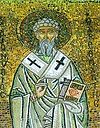

| Previous day | Next day |
| Old Style
October 3
|
Sunday |
New Style
October 16
|
| 18th Sunday after Pentecost. Tone 1. | No fast.
|
![]() Hieromartyrs Dionysius the Areopagite (96), bishop of Athens, the priest Rusticus, and the deacon Eleutherius (96).
Hieromartyrs Dionysius the Areopagite (96), bishop of Athens, the priest Rusticus, and the deacon Eleutherius (96).
St. John the Chozebite, bishop of Caesarea in Palestine (532). Blessed Hesychius the Silent, of Mt. Horeb (6th c.). St. Dionysius, recluse of the Kiev Caves (15th c.). Uncovering of the relics of St. Joseph, elder, of Optina Monastery (1988).
New Hiero-confessor Agathangelus (Preobrazhensky), metropolitan of Yaroslavl (1928).
St. Jerome of Aegina (1966). Hieromartyrs Dionysius, bishop of Alexandria, and the deacons Gaius and Faustus (ca. 265). St. Paisius I, patriarch of Serbia (1647).
Repose of Blessed Olga, fool-for-Christ, of Bogdanoya Bari and St. Petersburg (1960).
Thoughts for Each Day of the Year
According to the Daily Church Readings from the Word of God
By St. Theophan the Recluse

Nineteenth Sunday After Pentecost. [II Cor. 11:31-12:9; Luke 6:31-36]
The fundamental, original commandment is: love! It is a small word, but it expresses an all-encompassing thing. It is easy to say: you must love, but it is not easy to attain love to the necessary degree. It is also not exactly clear how to attain it; this is why the Saviour surrounds this commandment with other explanatory rules: love as thyself; and as ye would that men should do to you, do ye also to them likewise. Here is shown a degree of love that one can call boundless; for is there any limit to one’s love for oneself? And is there any good which one would not want for himself from others? Meanwhile, however, the instructions are not impossible to fulfil. The matter depends upon having perfect compassion toward others, to fully transfer their feelings to yourself, to feel the way they feel. When this occurs, there will be no need to point out what you must do for others in a given situation: your heart will show you. You must only take care to maintain compassion, otherwise egoism will immediately approach and return you to itself and confine you in itself. Then you will not lift a finger for another, and will not look at him, though he might be dying. When the Lord said: love thy neighbor as thyself, He meant that our neighbour should be in us, that is, in our heart, instead of our own selves. If our “I” remains in there as before, we cannot expect anything good to come of it.
Articles
 Martyrs Rusticus the Presbyter and Eleutherius the DeaconSaints Rusticus and Eleutherius were disciples of Saint Dionysius the Areopagite. |
 Venerable Hesychius of Mount HorebSaint Hesychius the Silent of Mt. Horeb, lived during the sixth century at one of the monasteries on Mt. Horeb, and at first he was not a very fervent monk. |
 Venerable Dionysius the Recluse of the Kiev CavesSaint Dionysius, Hermit of the Kiev Caves, Far Caves, called Schepa, is mentioned briefly in the Kiev Caves Paterikon. |


